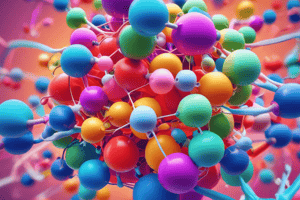Podcast
Questions and Answers
What are proteins composed of?
What are proteins composed of?
Amino acids
What Greek word is the origin of 'protein'?
What Greek word is the origin of 'protein'?
- Amino
- Base
- Proteios (correct)
- Acid
All amino acids have __________ structural features.
All amino acids have __________ structural features.
common
Which groups do all amino acids contain?
Which groups do all amino acids contain?
Amino acids can only act as an acid.
Amino acids can only act as an acid.
What does pKa indicate?
What does pKa indicate?
What happens when pH is lower than pKa?
What happens when pH is lower than pKa?
Amino acids are always ionized under physiological pH conditions.
Amino acids are always ionized under physiological pH conditions.
What are the building blocks of proteins?
What are the building blocks of proteins?
What does the Greek word 'proteios' mean?
What does the Greek word 'proteios' mean?
All amino acids have a fixed amino group (-NH2) and a __________ group.
All amino acids have a fixed amino group (-NH2) and a __________ group.
Amino acids are only weak bases.
Amino acids are only weak bases.
Under physiological pH conditions, what happens to amino acids?
Under physiological pH conditions, what happens to amino acids?
What happens to the amino group of an amino acid when it is protonated?
What happens to the amino group of an amino acid when it is protonated?
What does pKa indicate?
What does pKa indicate?
The lower the pKa, the stronger the acid.
The lower the pKa, the stronger the acid.
If pH is less than pKa, the amino acid is in its __________ form.
If pH is less than pKa, the amino acid is in its __________ form.
If pH is greater than pKa, the amino acid is in its __________ form.
If pH is greater than pKa, the amino acid is in its __________ form.
Flashcards are hidden until you start studying
Study Notes
Proteins: Essential Biomolecules
- Proteins are essential for nearly all cellular processes.
- Proteins are the most abundant biological macromolecules in cells.
- The word "protein" comes from the Greek word "proteios," meaning "of first importance."
Amino Acids: The Building Blocks of Proteins
- All proteins are composed of amino acids, which are the monomers of proteins.
- Amino acids have a common structure, consisting of:
- An amino group (-NH2)
- A carboxylic acid group (-COOH)
- A hydrogen atom bonded to the same carbon atom as the amino and carboxyl groups
- Amino acids are both weak acids and weak bases.
- Amino acids are distinguished by their unique side chains (R groups).
Ionization of Amino Acids
- Amino acids are ionized under physiological pH conditions.
- The amino group can be protonated (gaining a proton) to form a positively charged NH3+ group.
- The carboxylic acid group can be deprotonated (losing a proton) to form a negatively charged COO- group.
- The degree of protonation and deprotonation depends on the pH of the environment.
Protonation and pH: Understanding pKa
- pH measures the concentration of protons (H+) in a solution.
- Lower pH indicates higher proton concentration.
- pKa is a measure of the acidity of a specific compound, indicating its tendency to give away a proton.
- Lower pKa indicates a stronger acid, which readily releases protons.
Key Relationship: pH and pKa
- The protonation state of an amino acid is determined by comparing the pH of the environment and the pKa of the amino acid.
- If pH < pKa: The amino acid is protonated, as there are more protons available in the environment.
- If pH > pKa: The amino acid is deprotonated, as there are fewer protons available in the environment.
Proteins and Amino Acids
- Proteins are essential for almost all processes that occur within a cell.
- Proteins are the most abundant biological macromolecules found in cells.
- The word "protein" comes from the Greek word "Proteios" meaning "of first importance."
- All proteins are composed of monomers called amino acids.
Amino Acid Structure
- All amino acids share a common structure:
- an amino group (-NH2)
- a carboxyl group (-COOH)
- a hydrogen atom bonded to the same carbon atom as the amino and carboxyl groups
- The variable part of the amino acid is the side chain (R group) which is unique to each amino acid.
- Under physiological conditions, amino acids are ionized.
- The amino group (base) can be protonated (gain a proton) resulting in a positive charge, forming -NH3+.
- The carboxyl group (acid) can be deprotonated (lose a proton) resulting in a negative charge, forming -COO-.
- The protonation and deprotonation of amino acids depends on the pH of their environment.
pH and pKa
- pH is a measure of the concentration of protons (H+) in an environment.
- The lower the pH, the higher the concentration of protons.
- pKa is a measure of the acid strength of a molecule.
- pKa is a material property (constant) meaning it doesn’t change for a given molecule.
- The lower the pKa, the stronger the acid and the easier it is for an amino acid to release protons.
pH and Protonation
- Compare the pH of the environment to the pKa of the amino acid to determine its ionization state.
- If the pH is less than the pKa (pH < pKa), the amino acid will be protonated.
- If the pH is greater than the pKa (pH > pKa), the amino acid will be deprotonated.
Studying That Suits You
Use AI to generate personalized quizzes and flashcards to suit your learning preferences.




